Business Finance Assignment: Management and Financial Accounting
VerifiedAdded on 2023/01/11
|7
|1306
|41
Report
AI Summary
This report assesses the key differences between management accounting and financial accounting, highlighting their distinct objectives, users, and legal requirements. Management accounting focuses on internal decision-making, providing information to managers for planning, organizing, and controlling business activities. Financial accounting, on the other hand, is geared towards external stakeholders, offering a comprehensive view of a company's financial position through the preparation of financial statements. The report details the differences in reporting periods, the nature of information provided, and the level of confidentiality. It also explores the diverse user groups of each accounting type, including managers, employees, shareholders, and government entities, and explains how they utilize accounting information for various purposes. The report emphasizes the importance of both accounting methods in effective business management and financial reporting, drawing on various sources to support its analysis.
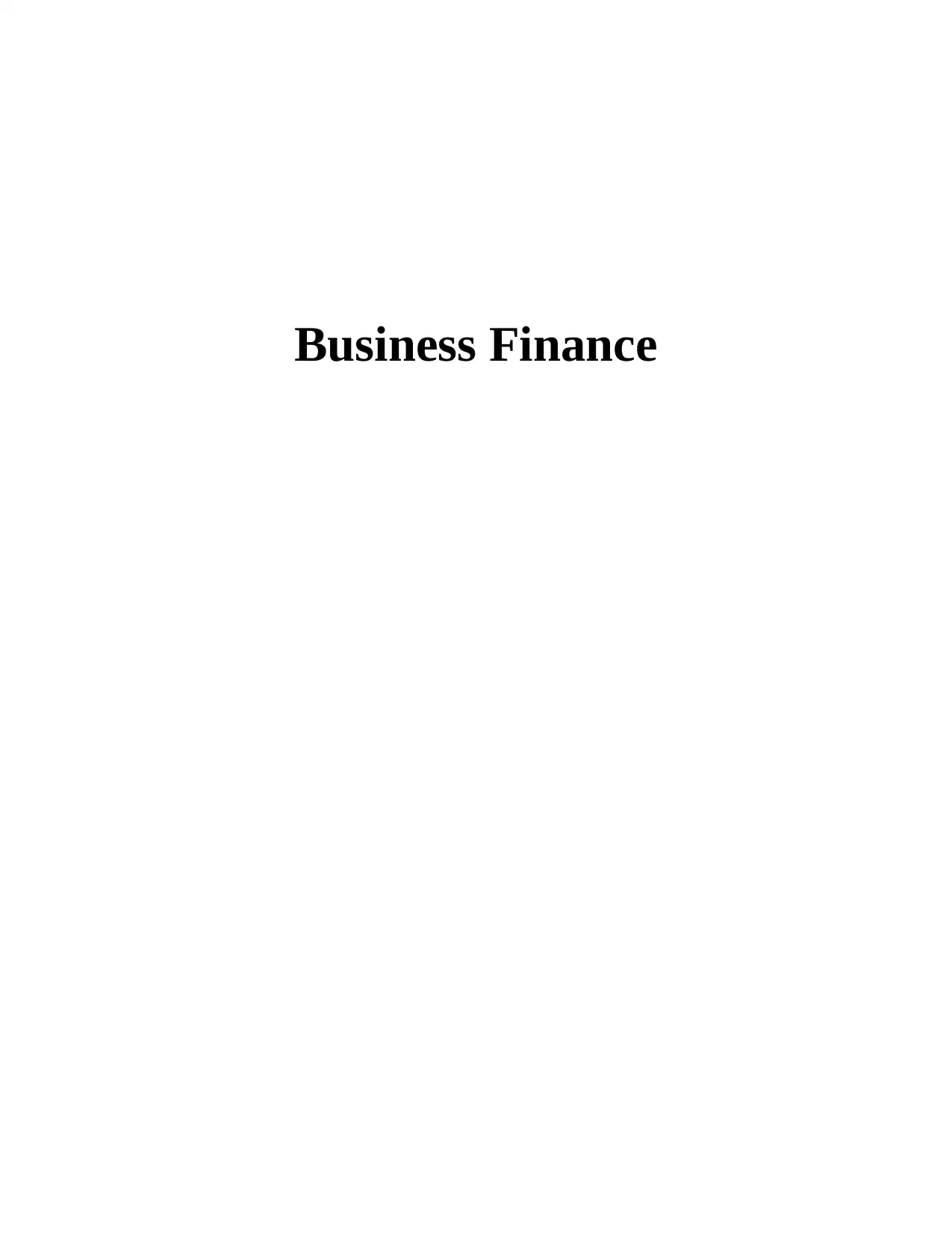
Business Finance
Paraphrase This Document
Need a fresh take? Get an instant paraphrase of this document with our AI Paraphraser
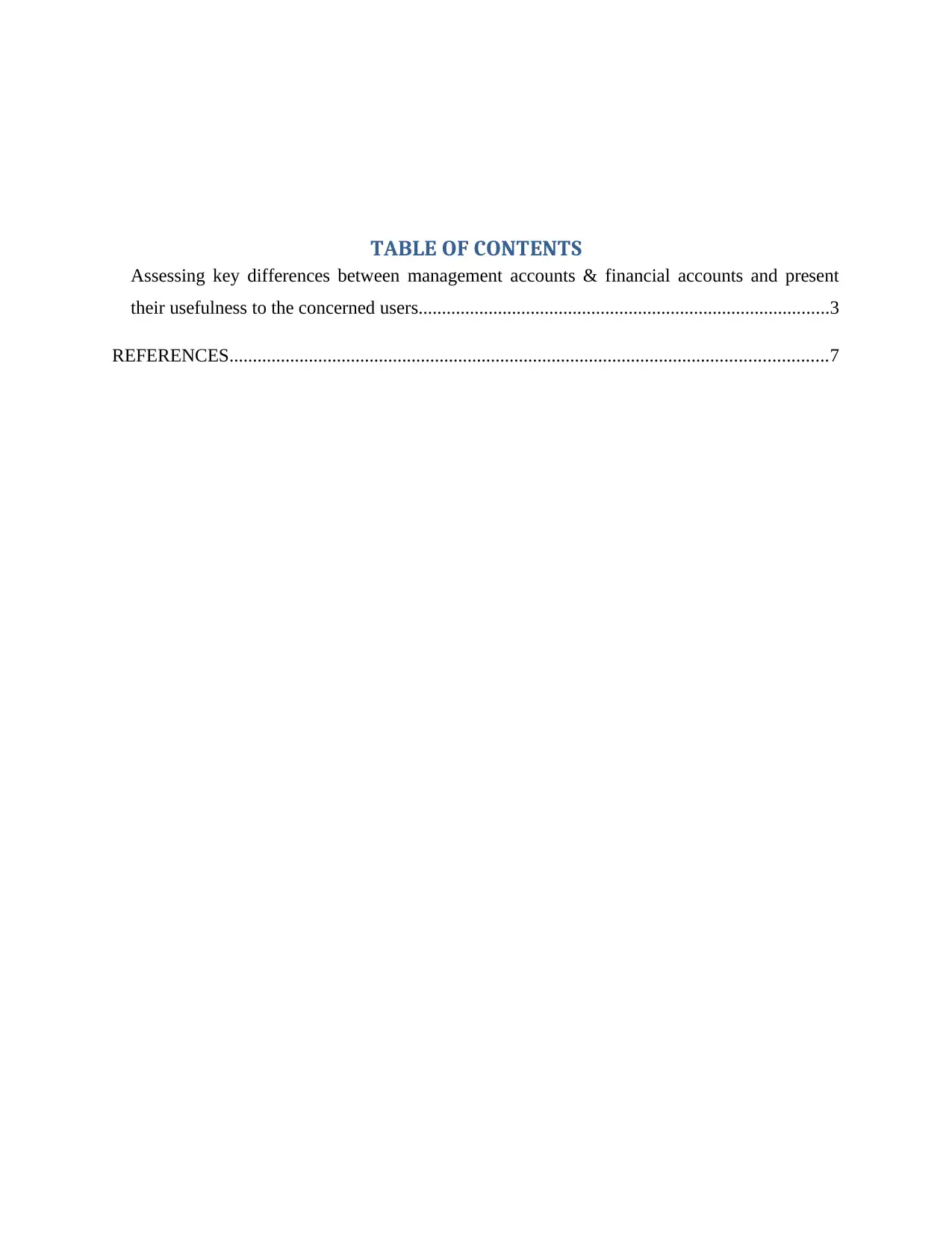
TABLE OF CONTENTS
Assessing key differences between management accounts & financial accounts and present
their usefulness to the concerned users........................................................................................3
REFERENCES................................................................................................................................7
Assessing key differences between management accounts & financial accounts and present
their usefulness to the concerned users........................................................................................3
REFERENCES................................................................................................................................7
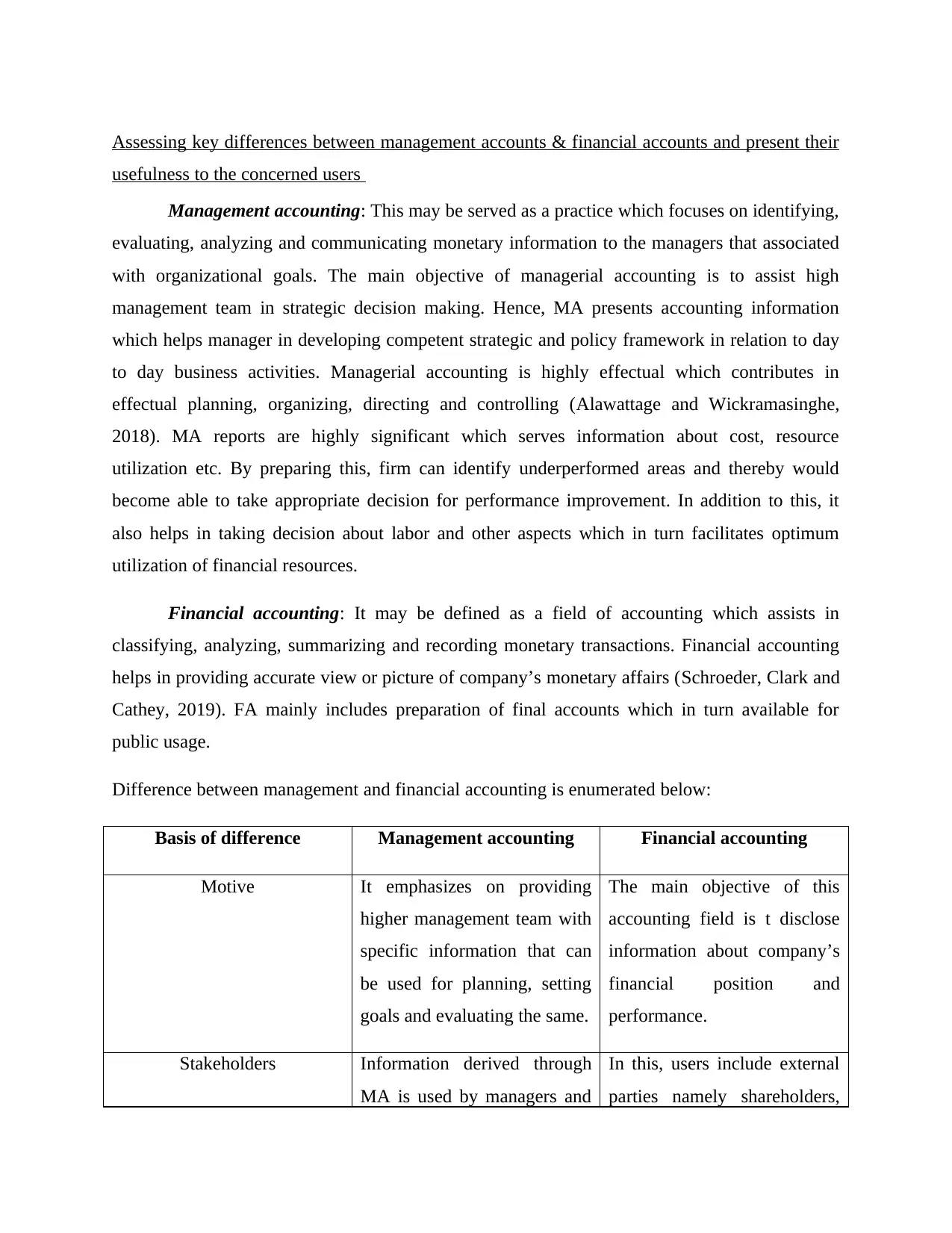
Assessing key differences between management accounts & financial accounts and present their
usefulness to the concerned users
Management accounting: This may be served as a practice which focuses on identifying,
evaluating, analyzing and communicating monetary information to the managers that associated
with organizational goals. The main objective of managerial accounting is to assist high
management team in strategic decision making. Hence, MA presents accounting information
which helps manager in developing competent strategic and policy framework in relation to day
to day business activities. Managerial accounting is highly effectual which contributes in
effectual planning, organizing, directing and controlling (Alawattage and Wickramasinghe,
2018). MA reports are highly significant which serves information about cost, resource
utilization etc. By preparing this, firm can identify underperformed areas and thereby would
become able to take appropriate decision for performance improvement. In addition to this, it
also helps in taking decision about labor and other aspects which in turn facilitates optimum
utilization of financial resources.
Financial accounting: It may be defined as a field of accounting which assists in
classifying, analyzing, summarizing and recording monetary transactions. Financial accounting
helps in providing accurate view or picture of company’s monetary affairs (Schroeder, Clark and
Cathey, 2019). FA mainly includes preparation of final accounts which in turn available for
public usage.
Difference between management and financial accounting is enumerated below:
Basis of difference Management accounting Financial accounting
Motive It emphasizes on providing
higher management team with
specific information that can
be used for planning, setting
goals and evaluating the same.
The main objective of this
accounting field is t disclose
information about company’s
financial position and
performance.
Stakeholders Information derived through
MA is used by managers and
In this, users include external
parties namely shareholders,
usefulness to the concerned users
Management accounting: This may be served as a practice which focuses on identifying,
evaluating, analyzing and communicating monetary information to the managers that associated
with organizational goals. The main objective of managerial accounting is to assist high
management team in strategic decision making. Hence, MA presents accounting information
which helps manager in developing competent strategic and policy framework in relation to day
to day business activities. Managerial accounting is highly effectual which contributes in
effectual planning, organizing, directing and controlling (Alawattage and Wickramasinghe,
2018). MA reports are highly significant which serves information about cost, resource
utilization etc. By preparing this, firm can identify underperformed areas and thereby would
become able to take appropriate decision for performance improvement. In addition to this, it
also helps in taking decision about labor and other aspects which in turn facilitates optimum
utilization of financial resources.
Financial accounting: It may be defined as a field of accounting which assists in
classifying, analyzing, summarizing and recording monetary transactions. Financial accounting
helps in providing accurate view or picture of company’s monetary affairs (Schroeder, Clark and
Cathey, 2019). FA mainly includes preparation of final accounts which in turn available for
public usage.
Difference between management and financial accounting is enumerated below:
Basis of difference Management accounting Financial accounting
Motive It emphasizes on providing
higher management team with
specific information that can
be used for planning, setting
goals and evaluating the same.
The main objective of this
accounting field is t disclose
information about company’s
financial position and
performance.
Stakeholders Information derived through
MA is used by managers and
In this, users include external
parties namely shareholders,
⊘ This is a preview!⊘
Do you want full access?
Subscribe today to unlock all pages.

Trusted by 1+ million students worldwide
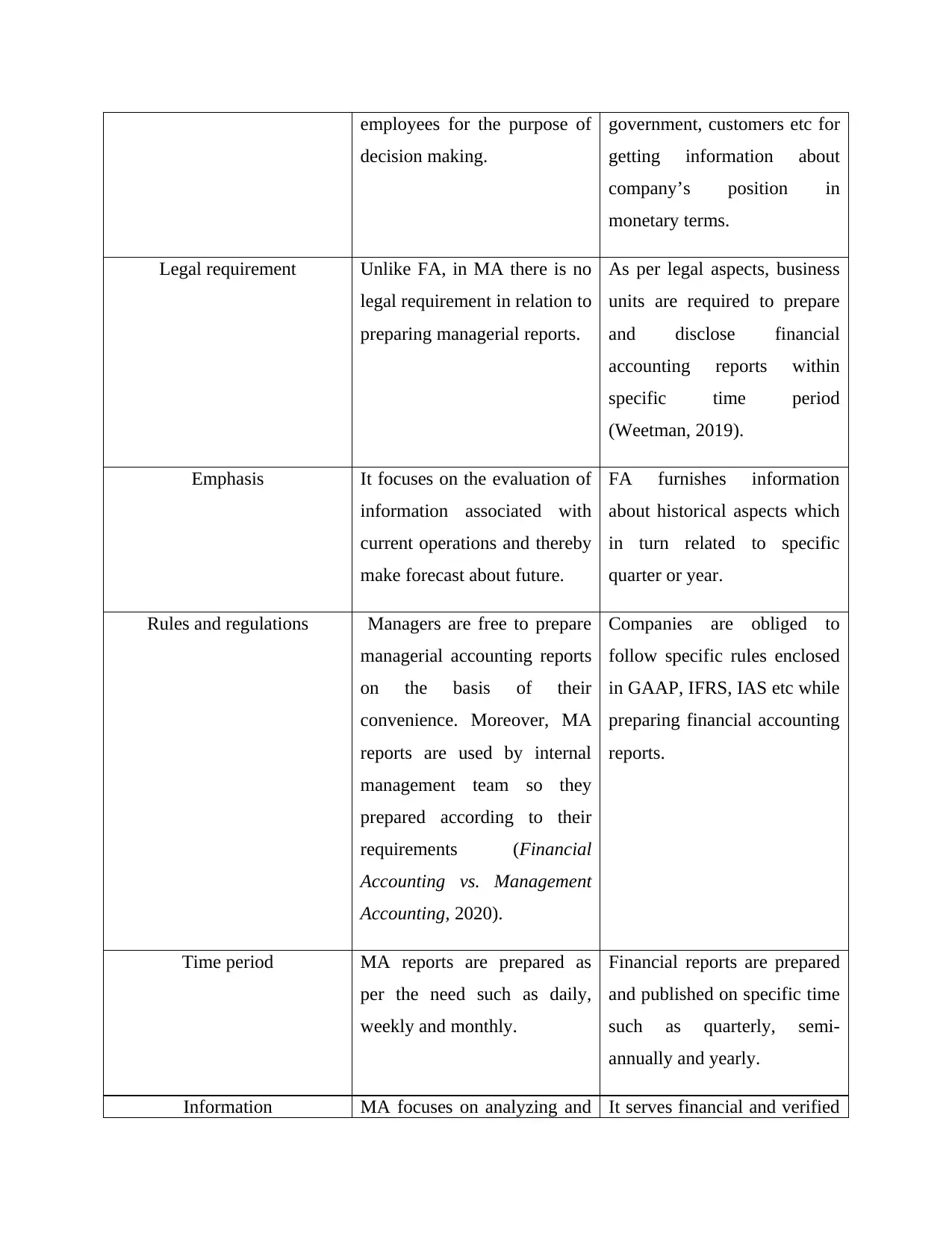
employees for the purpose of
decision making.
government, customers etc for
getting information about
company’s position in
monetary terms.
Legal requirement Unlike FA, in MA there is no
legal requirement in relation to
preparing managerial reports.
As per legal aspects, business
units are required to prepare
and disclose financial
accounting reports within
specific time period
(Weetman, 2019).
Emphasis It focuses on the evaluation of
information associated with
current operations and thereby
make forecast about future.
FA furnishes information
about historical aspects which
in turn related to specific
quarter or year.
Rules and regulations Managers are free to prepare
managerial accounting reports
on the basis of their
convenience. Moreover, MA
reports are used by internal
management team so they
prepared according to their
requirements (Financial
Accounting vs. Management
Accounting, 2020).
Companies are obliged to
follow specific rules enclosed
in GAAP, IFRS, IAS etc while
preparing financial accounting
reports.
Time period MA reports are prepared as
per the need such as daily,
weekly and monthly.
Financial reports are prepared
and published on specific time
such as quarterly, semi-
annually and yearly.
Information MA focuses on analyzing and It serves financial and verified
decision making.
government, customers etc for
getting information about
company’s position in
monetary terms.
Legal requirement Unlike FA, in MA there is no
legal requirement in relation to
preparing managerial reports.
As per legal aspects, business
units are required to prepare
and disclose financial
accounting reports within
specific time period
(Weetman, 2019).
Emphasis It focuses on the evaluation of
information associated with
current operations and thereby
make forecast about future.
FA furnishes information
about historical aspects which
in turn related to specific
quarter or year.
Rules and regulations Managers are free to prepare
managerial accounting reports
on the basis of their
convenience. Moreover, MA
reports are used by internal
management team so they
prepared according to their
requirements (Financial
Accounting vs. Management
Accounting, 2020).
Companies are obliged to
follow specific rules enclosed
in GAAP, IFRS, IAS etc while
preparing financial accounting
reports.
Time period MA reports are prepared as
per the need such as daily,
weekly and monthly.
Financial reports are prepared
and published on specific time
such as quarterly, semi-
annually and yearly.
Information MA focuses on analyzing and It serves financial and verified
Paraphrase This Document
Need a fresh take? Get an instant paraphrase of this document with our AI Paraphraser
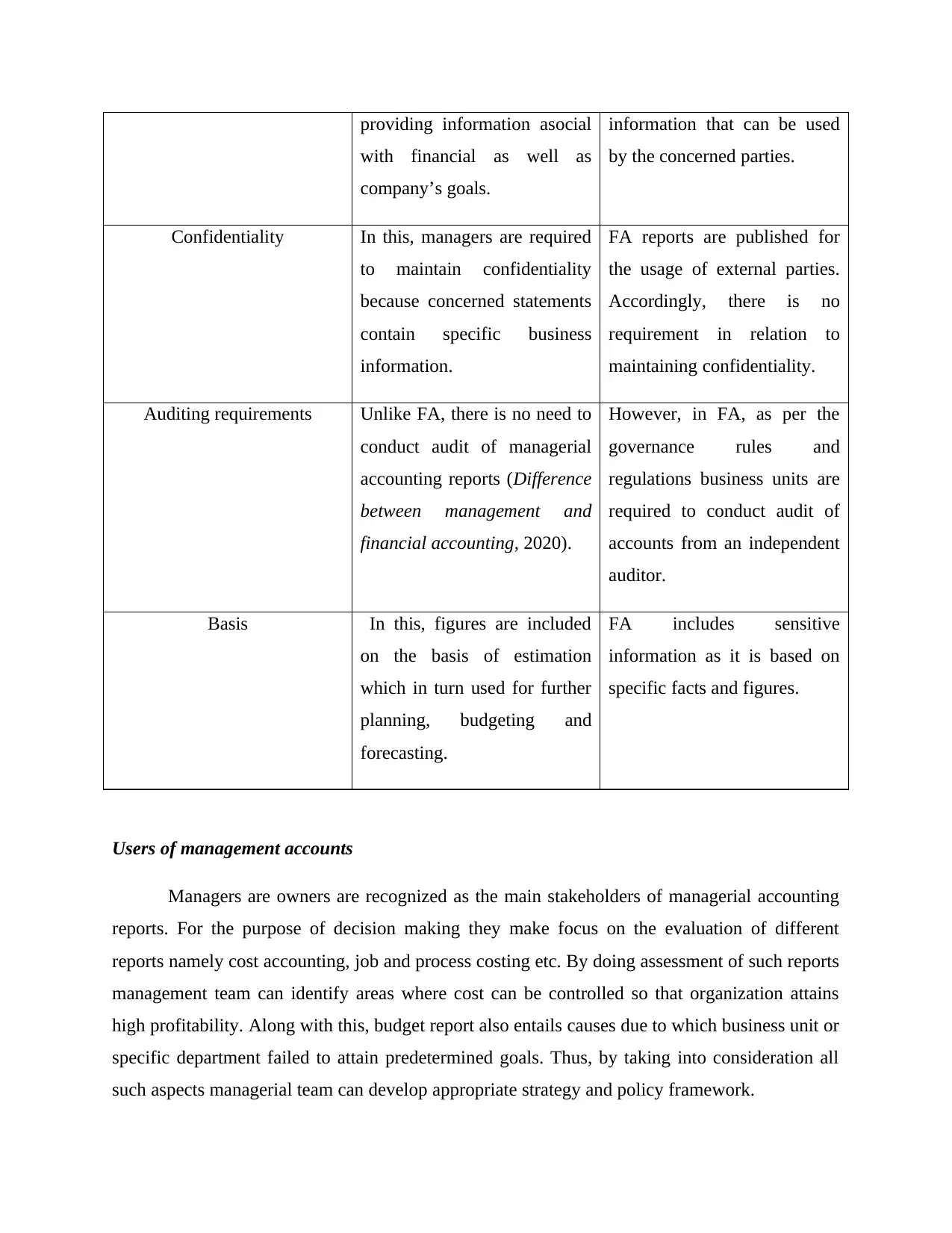
providing information asocial
with financial as well as
company’s goals.
information that can be used
by the concerned parties.
Confidentiality In this, managers are required
to maintain confidentiality
because concerned statements
contain specific business
information.
FA reports are published for
the usage of external parties.
Accordingly, there is no
requirement in relation to
maintaining confidentiality.
Auditing requirements Unlike FA, there is no need to
conduct audit of managerial
accounting reports (Difference
between management and
financial accounting, 2020).
However, in FA, as per the
governance rules and
regulations business units are
required to conduct audit of
accounts from an independent
auditor.
Basis In this, figures are included
on the basis of estimation
which in turn used for further
planning, budgeting and
forecasting.
FA includes sensitive
information as it is based on
specific facts and figures.
Users of management accounts
Managers are owners are recognized as the main stakeholders of managerial accounting
reports. For the purpose of decision making they make focus on the evaluation of different
reports namely cost accounting, job and process costing etc. By doing assessment of such reports
management team can identify areas where cost can be controlled so that organization attains
high profitability. Along with this, budget report also entails causes due to which business unit or
specific department failed to attain predetermined goals. Thus, by taking into consideration all
such aspects managerial team can develop appropriate strategy and policy framework.
with financial as well as
company’s goals.
information that can be used
by the concerned parties.
Confidentiality In this, managers are required
to maintain confidentiality
because concerned statements
contain specific business
information.
FA reports are published for
the usage of external parties.
Accordingly, there is no
requirement in relation to
maintaining confidentiality.
Auditing requirements Unlike FA, there is no need to
conduct audit of managerial
accounting reports (Difference
between management and
financial accounting, 2020).
However, in FA, as per the
governance rules and
regulations business units are
required to conduct audit of
accounts from an independent
auditor.
Basis In this, figures are included
on the basis of estimation
which in turn used for further
planning, budgeting and
forecasting.
FA includes sensitive
information as it is based on
specific facts and figures.
Users of management accounts
Managers are owners are recognized as the main stakeholders of managerial accounting
reports. For the purpose of decision making they make focus on the evaluation of different
reports namely cost accounting, job and process costing etc. By doing assessment of such reports
management team can identify areas where cost can be controlled so that organization attains
high profitability. Along with this, budget report also entails causes due to which business unit or
specific department failed to attain predetermined goals. Thus, by taking into consideration all
such aspects managerial team can develop appropriate strategy and policy framework.
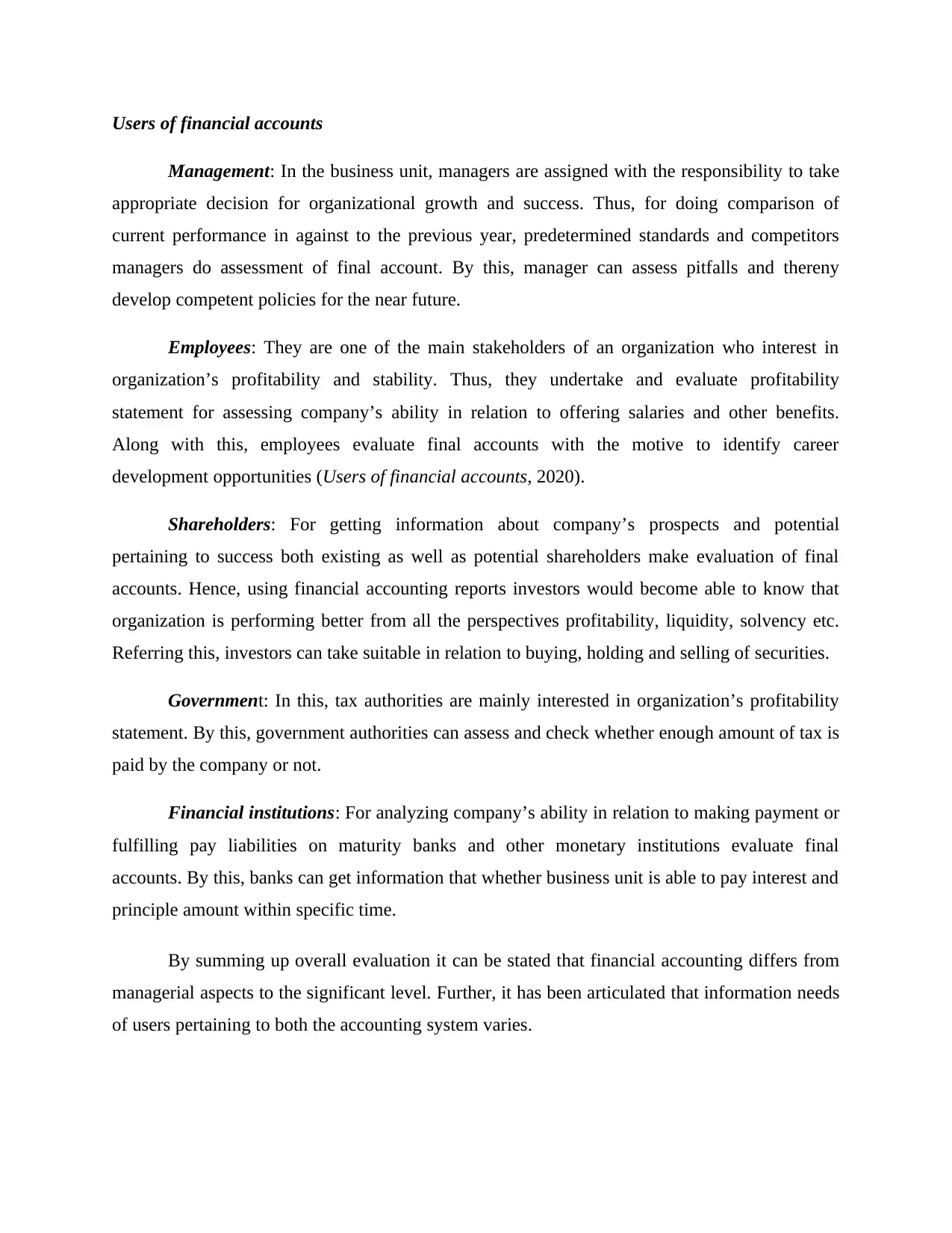
Users of financial accounts
Management: In the business unit, managers are assigned with the responsibility to take
appropriate decision for organizational growth and success. Thus, for doing comparison of
current performance in against to the previous year, predetermined standards and competitors
managers do assessment of final account. By this, manager can assess pitfalls and thereny
develop competent policies for the near future.
Employees: They are one of the main stakeholders of an organization who interest in
organization’s profitability and stability. Thus, they undertake and evaluate profitability
statement for assessing company’s ability in relation to offering salaries and other benefits.
Along with this, employees evaluate final accounts with the motive to identify career
development opportunities (Users of financial accounts, 2020).
Shareholders: For getting information about company’s prospects and potential
pertaining to success both existing as well as potential shareholders make evaluation of final
accounts. Hence, using financial accounting reports investors would become able to know that
organization is performing better from all the perspectives profitability, liquidity, solvency etc.
Referring this, investors can take suitable in relation to buying, holding and selling of securities.
Government: In this, tax authorities are mainly interested in organization’s profitability
statement. By this, government authorities can assess and check whether enough amount of tax is
paid by the company or not.
Financial institutions: For analyzing company’s ability in relation to making payment or
fulfilling pay liabilities on maturity banks and other monetary institutions evaluate final
accounts. By this, banks can get information that whether business unit is able to pay interest and
principle amount within specific time.
By summing up overall evaluation it can be stated that financial accounting differs from
managerial aspects to the significant level. Further, it has been articulated that information needs
of users pertaining to both the accounting system varies.
Management: In the business unit, managers are assigned with the responsibility to take
appropriate decision for organizational growth and success. Thus, for doing comparison of
current performance in against to the previous year, predetermined standards and competitors
managers do assessment of final account. By this, manager can assess pitfalls and thereny
develop competent policies for the near future.
Employees: They are one of the main stakeholders of an organization who interest in
organization’s profitability and stability. Thus, they undertake and evaluate profitability
statement for assessing company’s ability in relation to offering salaries and other benefits.
Along with this, employees evaluate final accounts with the motive to identify career
development opportunities (Users of financial accounts, 2020).
Shareholders: For getting information about company’s prospects and potential
pertaining to success both existing as well as potential shareholders make evaluation of final
accounts. Hence, using financial accounting reports investors would become able to know that
organization is performing better from all the perspectives profitability, liquidity, solvency etc.
Referring this, investors can take suitable in relation to buying, holding and selling of securities.
Government: In this, tax authorities are mainly interested in organization’s profitability
statement. By this, government authorities can assess and check whether enough amount of tax is
paid by the company or not.
Financial institutions: For analyzing company’s ability in relation to making payment or
fulfilling pay liabilities on maturity banks and other monetary institutions evaluate final
accounts. By this, banks can get information that whether business unit is able to pay interest and
principle amount within specific time.
By summing up overall evaluation it can be stated that financial accounting differs from
managerial aspects to the significant level. Further, it has been articulated that information needs
of users pertaining to both the accounting system varies.
⊘ This is a preview!⊘
Do you want full access?
Subscribe today to unlock all pages.

Trusted by 1+ million students worldwide
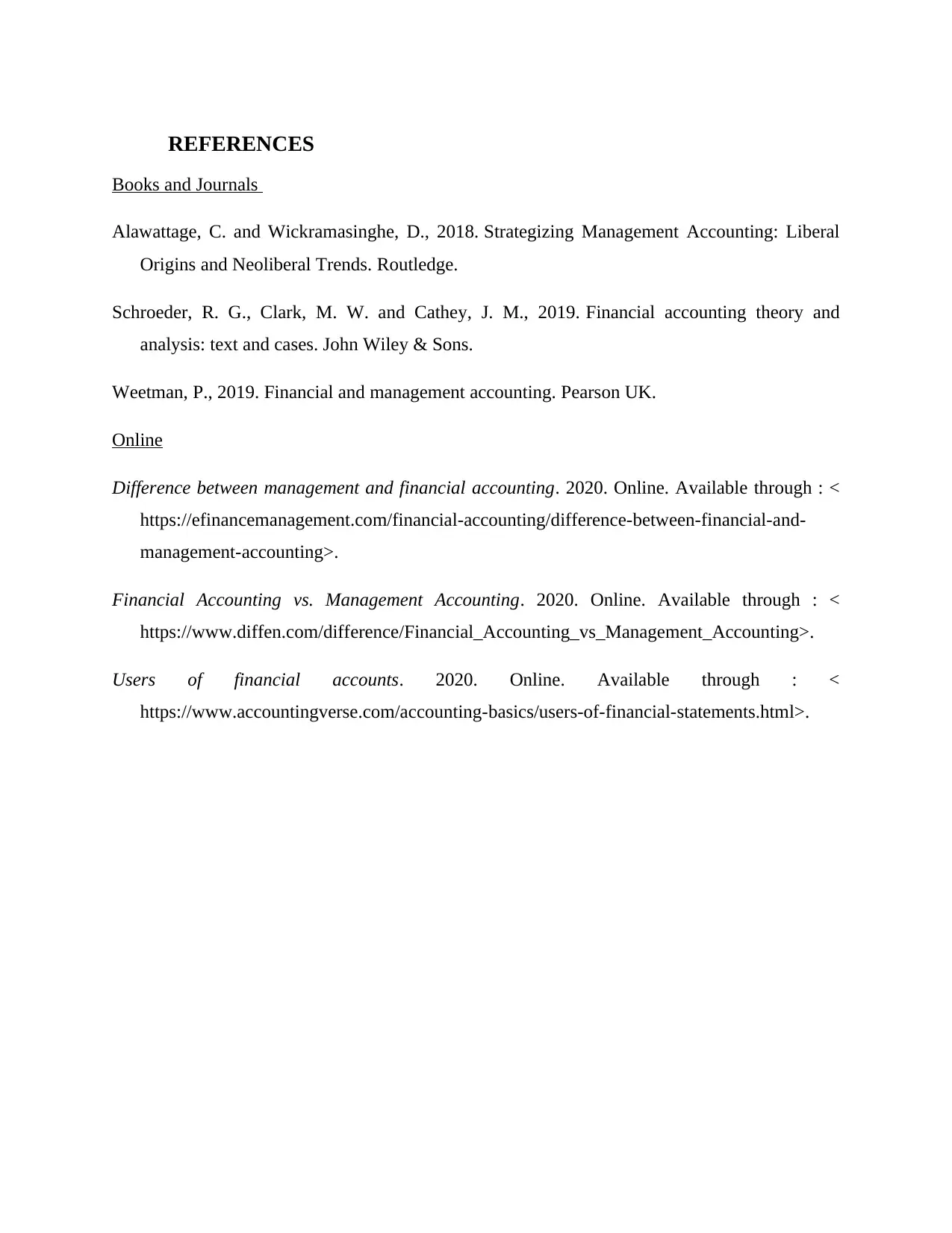
REFERENCES
Books and Journals
Alawattage, C. and Wickramasinghe, D., 2018. Strategizing Management Accounting: Liberal
Origins and Neoliberal Trends. Routledge.
Schroeder, R. G., Clark, M. W. and Cathey, J. M., 2019. Financial accounting theory and
analysis: text and cases. John Wiley & Sons.
Weetman, P., 2019. Financial and management accounting. Pearson UK.
Online
Difference between management and financial accounting. 2020. Online. Available through : <
https://efinancemanagement.com/financial-accounting/difference-between-financial-and-
management-accounting>.
Financial Accounting vs. Management Accounting. 2020. Online. Available through : <
https://www.diffen.com/difference/Financial_Accounting_vs_Management_Accounting>.
Users of financial accounts. 2020. Online. Available through : <
https://www.accountingverse.com/accounting-basics/users-of-financial-statements.html>.
Books and Journals
Alawattage, C. and Wickramasinghe, D., 2018. Strategizing Management Accounting: Liberal
Origins and Neoliberal Trends. Routledge.
Schroeder, R. G., Clark, M. W. and Cathey, J. M., 2019. Financial accounting theory and
analysis: text and cases. John Wiley & Sons.
Weetman, P., 2019. Financial and management accounting. Pearson UK.
Online
Difference between management and financial accounting. 2020. Online. Available through : <
https://efinancemanagement.com/financial-accounting/difference-between-financial-and-
management-accounting>.
Financial Accounting vs. Management Accounting. 2020. Online. Available through : <
https://www.diffen.com/difference/Financial_Accounting_vs_Management_Accounting>.
Users of financial accounts. 2020. Online. Available through : <
https://www.accountingverse.com/accounting-basics/users-of-financial-statements.html>.
1 out of 7
Related Documents
Your All-in-One AI-Powered Toolkit for Academic Success.
+13062052269
info@desklib.com
Available 24*7 on WhatsApp / Email
![[object Object]](/_next/static/media/star-bottom.7253800d.svg)
Unlock your academic potential
Copyright © 2020–2025 A2Z Services. All Rights Reserved. Developed and managed by ZUCOL.





